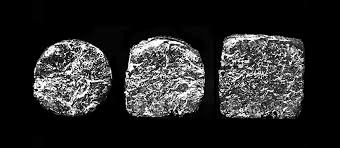Imagine an aircraft that could alter its wing shape in midflight and, like a pelican, dive into the water before morphing into a submarine. Professor Rob Shepherd might help make that futuristic-sounding vehicle a reality.
The key is a hybrid material featuring stiff metal and soft, porous rubber foam that combines the best properties of both — stiffness when it’s called for, and elasticity when a change of shape is required. The material also has the ability to self-heal following damage.
“It’s sort of like us — we have a skeleton, plus soft muscles and skin,” Shepherd said. “Unfortunately, that skeleton limits our ability to change shape — unlike an octopus, which does not have a skeleton.”
The idea blends the rigidity and load-bearing capacity of humans with the ability to dramatically alter shape, like an octopus.
“That’s what this idea is about, to have a skeleton when you need it, melt it away when you don’t, and then reform it,” Shepherd said.
This hybrid material combines a soft alloy called Field’s metal with a porous silicone foam. In addition to its low melting point of 144 degrees Fahrenheit, Field’s metal was chosen because, unlike similar alloys, it contains no lead.
“In general, we want the things we make in this lab to be biocompatible,” said Ilse Van Meerbeek, a graduate student in the field of mechanical engineering and a contributor to the paper.
The elastomer foam is dipped into the molten metal, and then placed in a vacuum so that the air in the foam’s pores is removed and replaced by the alloy. The foam had pore sizes of about 2 millimeters; that can be tuned to create a stiffer or a more flexible material.
In testing of its strength and elasticity, the material showed an ability to deform when heated above 144 degrees, regain rigidity when cooled, and then return to its original shape and strength when reheated.
“Sometimes you want a robot, or any machine, to be stiff,” said Shepherd, whose group recently published a paper on electroluminescent skin, which also has applications in soft robotics.
“But when you make them stiff, they can’t morph their shape very well. And to give a soft robot both capabilities, to be able to morph their structure but also to be stiff and bear load, that’s what this material does.”
Source: Science daily
N.H.Kh

